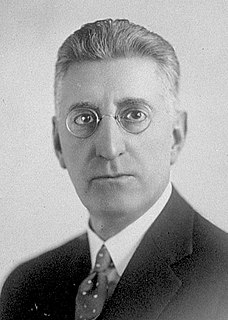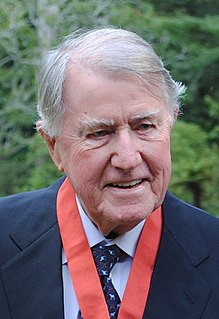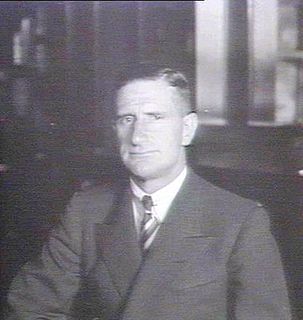Related Research Articles
Members of the New South Wales Legislative Assembly who served in the 49th parliament held their seats from 1988 to 1991. They were elected at the 1988 state election, and at by-elections. The Speaker was Kevin Rozzoli.</ref>

Reginald Walter Darcy Weaver was an Australian conservative parliamentarian who served in the New South Wales Legislative Assembly for 28 years. Serving from 1917 in the backbenches, he entered the cabinet of Thomas Bavin in 1929 as Secretary for Mines and Minister for Forests until he returned to opposition in 1930. Following the success of the United Australia Party in the 1932 election, Weaver returned as the Secretary for Public Works and Minister for Health in the Stevens ministry.

Elections were held in the state of New South Wales, Australia, on Saturday 19 September 1981. The result was a second "Wranslide": a landslide victory for the Labor Party under Neville Wran. Labor increased its already sizeable majority, winning what is still its biggest-ever share of seats in the New South Wales Legislative Assembly–69 out of 99 seats, 69.7 percent of the chamber.

Lieutenant Colonel Sir Michael Frederick Bruxner was an Australian politician and soldier, serving for many years as leader of the Country Party in New South Wales. Born in the north of the state, Bruxner was educated at The Armidale School and started studies at University of Sydney but later dropped out to take up employment as a grazier and station agent in Tenterfield. After serving in the Citizen Military Forces from 1911, Bruxner enlisted into the Australian Light Horse upon the outbreak of the First World War in 1914. Serving with distinction in Gallipoli, Egypt and Palestine, he was promoted to lieutenant colonel and awarded the Distinguished Service Order.

Kenneth George Booth was a New South Wales politician, Treasurer, and Minister of the Crown in the cabinets of Neville Wran and Barrie Unsworth. From 1981 to 1988 he was the Treasurer of New South Wales. He was a member of the New South Wales Legislative Assembly for 28 years from 8 October 1960 until his death on 1 November 1988 for the Labor Party, representing the seats of Kurri Kurri and Wallsend.
Roger Corfield Anson Wotton was an Australian politician. He was the Country Party member for Burrendong from 1968 to 1971 and from 1973 to 1981, and then for Castlereagh from 1981 to 1991 in the New South Wales Legislative Assembly.
Members of the New South Wales Legislative Assembly who served in the 29th parliament held their seats from 1930 to 1932. They were elected at the 1930 state election, and at by-elections. The Nationalist Party was replaced by the United Australia Party in 1931. The Speaker was Frank Burke.</ref>

Sir Vernon Haddon Treatt was an Australian lawyer, soldier, Rhodes Scholar and politician. Born in Singleton, New South Wales and educated at Shore School, Treatt interrupted his studies at the University of Sydney to enlist at the outbreak of the First World War. Serving in the Royal Australian Artillery, Treatt served in France and was awarded the Military Medal. Upon returning to Australia he was awarded a Rhodes scholarship and further educated at New College, Oxford.
Colin Murray "Col" Fisher, OAM was an Australian politician. He was the National Party member for Upper Hunter in the New South Wales Legislative Assembly from 1970 to 1988, and held ministerial positions from 1975 to 1976.
Roger Bede Nott was an Australian politician and a member of the New South Wales Legislative Assembly from 1941 until 1961. He was a member of the Labor Party and held numerous ministerial positions between 1954 and 1961. He was the Administrator of the Northern Territory between 1961 and 1964.
Clive Geoffrey Osborne was an Australian politician. He was a Country Party/National Party member of the New South Wales Legislative Assembly from 1967 to 1981, representing the electorate of Bathurst.
Heathcote Clifford (Cliff) Mallam was an Australian politician and a member of the New South Wales Legislative Assembly between 1953 and 1968 and between 1971 and 1981. He was a member of the Labor Party (ALP).
Leo Mervyn Nott was an Australian politician and a member of the New South Wales Legislative Assembly between 1953 and 1968 and again between 1971 and 1973. He was a member of the NSW Branch of the Labor Party.
Alfred William Yeo was an Australian politician. He was a Country Party member of the New South Wales Legislative Assembly from 1932 to 1941, representing the electorate of Castlereagh.
Coffs Harbour, an electoral district of the Legislative Assembly in the Australian state of New South Wales, was created in 1981 and has always been held by the National party.
The 1917 New South Wales state election involved 90 electoral district returning one member each. If a candidate failed to achieve at least 50% of the vote in an electorate, a run-off election would take place in the following weeks. In this election, 8 electorates proceeded to second round elections.
The 1907 New South Wales state election involved 90 electoral districts returning one member each. The election was conducted on the basis of a simple majority or first-past-the-post voting system.
The 1904 New South Wales state election involved 90 electoral districts returning one member each. The election was conducted on the basis of a simple majority or first-past-the-post voting system. There were two significant changes from the 1901 election, the first was that women were given the right to vote, which saw an increase in the number of enrolled voters from 345,500 in 1901, to 689,490 in 1904. The second was that as a result of the 1903 New South Wales referendum, the number of members of the Legislative Assembly was reduced from 125 to 90. The combined effect of the changes meant that the average number of enrolled voters per electorate went from 2,764, to 7,661, an increase of 277%. Leichhardt was the only district that was not substantially changed, while The Macquarie and The Murray districts retained nothing but the name.
Sturt, an electoral district of the Legislative Assembly in the Australian state of New South Wales, had two incarnations, from 1889 until 1968 and from 1971 until 1981.
A by-election was held in the state electoral district of Coffs Harbour on 3 November 1990. The by-election was triggered by the resignation of Matt Singleton (National).
References
- 1 2 "Mr (Matt) Matthew Singleton". Former Members of the Parliament of New South Wales . Retrieved 11 May 2019.
- ↑ Green, Antony. "Elections for the district of Clarence". New South Wales Election Results 1856-2007. Parliament of New South Wales . Retrieved 9 September 2019.
- ↑ Green, Antony. "Elections for the district of Coffs Harbour". New South Wales Election Results 1856-2007. Parliament of New South Wales . Retrieved 9 September 2019.